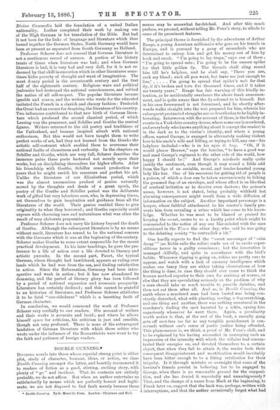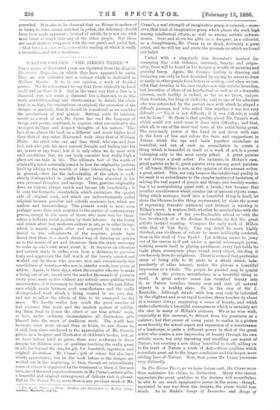DOUBLE CUNNING"
DIVIDING novels into those whose especial strong point is either plot, study of character, humour, ideas, or action, we class Double Cunning amongst the latter, and heartily recommend it to readers of fiction as a good, stirring, exciting story, with plenty of " go " and incident. That its contents are entirely probable, we do not affirm. But when an author entertains us satisfactorily by means which are perfectly honest and legiti- mate, we are not disposed to find fault merely because those • Double Cunning. By G. Manville Fenn. London: Chapman and Hall.
means may be somewhat far-fetched. And after this much preface, we proceed, without telling Mr. Fenn's story, to allude to some of its prominent features.
The principal theme is furnished by the adventures of Arthur Range, a young American millionaire who goes on his travels in Europe, and is pursued by a gang of scoundrels who are determined to entrap him and get his money out of him by hook and crook. " I'm going to lay traps," says one of them ; " I'm going to spread nets ; I'm going to be the unseen spider for that little golden fly. The threads shall cling round him till he's helpless, and he shall say, ' There you are, suck my blood ; suck all you want, but leave me just enough to
live.' I'm going to spread that spider's web for that fly, if it's broken and torn five thousand times, and if it takes me twenty years." Range has fair warning of this kindly in- tention, as he accidentally overhears the above frank announce- ment, and is quite aware that the fly referred to is himself. But in his case forewarned is not forearmed, and he shortly after- wards walks straight into the web prepared for him, wherein his subsequent protracted struggles are so described as to be highly in- teresting. Interwoven with the account of these, is the history of events in a Yorkshire country-house, where some one is murdered, and everybody who knows anything about it (except the reader) is in the dark as to the victim's identity, and where a young officer, named George, is engaged in alternately making violent love to his uncle's wife and killing, or trying to kill, any one—his ladylove included—who is in his eyes de (rep. " Oh, if it would please Heaven," says the heroine, "to have a good war and send George's regiment to the other side of the world, how happy I should be !" And George's misdeeds really quite justify the sentiment, even though it may sound a little odd from the lips of an amiable, moral, and tender-hearted young lady like her. One of his resources for getting rid of people is a poison, of which a dose can be taken unconsciously in licking the gummed flap of an envelope, and whose effect is so like that of cerebral irritation as to deceive even doctors ; the poison's name, however, is not stated, being probably withheld lest alarming consequences might result from a wide diffusion of information on the subject. Another important personage is a keeper, whose faithful attachment to his master's family pre- vents him from revealing a crime which has come to his know- ledge. Whether he was most to be blamed or praised for keeping the secret, seems to us a knotty point which might be commended to the notice of any one like-minded with the man mentioned in the Times the other day, who said lie was going to the debating society "to contradick a bit."
One hardly expects to find the "sweet messenger of ' calm decay' " (as Keble calls the robin) made use of to excite super- stitious terror in a guilty conscience; but the innovation is managed fkilfully, and quite in accordance with the bird's habits. Wherever digging is going on, robins are pretty sure to appear, and watch with a look of uncanny intelligence which makes one fancy they are either taking observations of how the thing is done, in case they should ever come to think the human method superior to their own for arriving at worms, or else that they are speculating seriously on the problem of why a man should take so much trouble to provide dainties, and then not eat them after all. And as, in Double Cunning, the earth where a murdered man had been buried was being con- stantly disturbed, what with planting, sowing, a dog scratching, and one thing and another, there was nothing unnatural in the murderer's finding the spot haunted by a robin, eyeing him sagaciously whenever he went there. Again, a peculiarity worth notice is that, at the end of the book, a rascally gang gets off scot-free (as far as any tangible punishment is con- cerned) without one's sense of poetic justice being offended. This phenomenon is, we think, a proof of Mr. Fenn's skill, and to be explained by his having succeeded in conveying such an impression of the intensity with which the villains had concen- trated their energies on, and devoted themselves to, a certain object, that when they fail to attain it, the reader feels their consequent disappointment and mortification would inevitably have been bitter enough to be a fitting retribution for their iniquity. Is it through mistake or oversight that some of the heroine's friends persist in believing her to be engaged to George, when there is no reasonable ground for the supposi- tion, and she has denied it repeatedly and unambiguously P That, and the change of a name from Mark at the beginning, to Frank later on, suggest that the book was, perhaps, written with interruptions, and that the author occasionally forgot what had preceded. It is also to be observed that as Range is spoken of as being to some extent deficient in polish, the deficiency should have been made apparent ; instead of which, he is not one whit more blunt or rough than any of the other people. But these are small matters compared with the one grand and joyful fact, —that here is a cam avis, a novel the reading of which is really a recreation, and not a weariness.



































 Previous page
Previous page